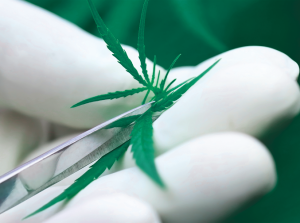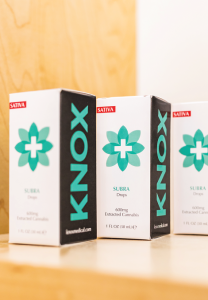Up in Smoke?
Medical marijuana is now legal in Florida, but families have little to fear from its availability so far.
 On November 8, 2016, Florida residents legalized medical marijuana via Amendment 2, which was spearheaded by famed Orlando attorney John Morgan and passed by more than 70 percent of voters. In June, that constitutional amendment officially went into effect when the passage of S.B. 8A set guidelines for how the people’s will would be implemented.
On November 8, 2016, Florida residents legalized medical marijuana via Amendment 2, which was spearheaded by famed Orlando attorney John Morgan and passed by more than 70 percent of voters. In June, that constitutional amendment officially went into effect when the passage of S.B. 8A set guidelines for how the people’s will would be implemented.
“The constitutional amendment was passed overwhelmingly,” says Gov. Rick Scott about the new laws, “and I’m glad the House and Senate were able to come together for a bill that makes sense for our state.”
Despite the passage of the amendment and its governing legislation, though, many residents in Greater Orlando and beyond have questions, hopes and fears about what medical marijuana will mean for their family. Who can grow it and sell it? Where can it be sold? What conditions can it be used for? How can you get a prescription? And most importantly of all: How will it affect our community?
As it turns out, the answer to that last one should be “very little” for most Floridians— including here in Greater Orlando.
Understanding the Law
The day after Amendment 2’s passage, Morgan gave a victory speech in downtown Orlando, claiming: “For the state of Florida, this will be a financial boon from the revenue side to the jobs side. You may need 2,000 dispensaries from the Panhandle and all the way down … What we will need now is [medical marijuana] facilities and dispensaries to take care of 400,000 to 500,000 people who need it.”
With S.B. 8A, though, the state legislature made it clear that we’re a long way off from the thousands of dispensaries that Morgan called for. Still, Jesse Kelley, legislative counsel to the Marijuana Policy Project’s (MPP’s) state campaigns department, thinks we’re off to a good start.
“S.B. 8A … includes 10 new licensed growers in the state in addition to the seven that already exist and allows growers to open 25 dispensaries, so there is a great likelihood that any patient in the state will have reasonable access to purchasing medical marijuana,” she says. (Growing the drug at home for personal medical use remains illegal.) “Furthermore, if a patient is unable to travel outside their home, dispensaries are allowed to deliver medical marijuana so long as the product is transported by dispensary employees and the patient pays a delivery fee of $25.”
For now, dispensaries can be found in Tallahassee, Gainesville, Tampa, Miami and Orlando, and more are expected to open in the coming months until the state hits its current limit. Finding communities that are willing to host dispensaries might be a stumbling block, though. (More on that in a bit.)
It’s also important to note that medical marijuana won’t be as easy to get in Florida as it was in, say, California when that state first made it legal. “Medical marijuana will be available for Florida residents with a qualifying condition,” says Kelley, “which includes cancer, epilepsy, glaucoma, [amyotrophic lateral sclerosis], Chrohn’s disease, [post-traumatic stress disorder], multiple sclerosis, Parkinson’s disease, HIV/AIDS and other serious conditions.”
In addition to fulltime residents, the law provides for seasonal and part-time residents, too, even if they’re registered to vote or pay taxes in another state. For those with approved conditions, a prescription is required from a qualified ordering physician, of which there were approximately 1,000 statewide when this issue went to press.
Last but not least, the law also details how and where medical marijuana can be used. “S.B. 8A provides that non-euphoric forms of marijuana can be used in public, but public use of full-strength medical marijuana remains a misdemeanor,” says Kelley, with non-euphoric referring to low-THC products that don’t produce a “high.”
Where usage is concerned, patients are allowed to “vape” the drug or eat products containing it, but smoking continues to be illegal in public and at home—a point of contention that led to Morgan filing a lawsuit against the state shortly after the bill’s passage. Per Morgan, while the wording of Amendment 2 explicitly banned smoking marijuana in public, no such provision was made for private use, and Morgan sees it as legislative overreach.
“It doesn’t take a genius to figure out that if smoking is not allowed in public, it must certainly be allowed in private,” says Morgan. “That’s the intent.”
Impact on Orlando
So far, medical marijuana has had little impact on the Greater Orlando area—and that’s not likely to change anytime soon. Currently, there are 29 qualified prescribing doctors in Orange County, 20 in Seminole and six in Osceola.
Local dispensaries are few and far between, too, and those waiting for more to open shouldn’t hold their breath. In April, Mayor Teresa Jacobs signed off on extending a temporary moratorium on medical-marijuana activity in unincorporated Orange County for six months or until a regulating ordinance is passed. Orlando, Winter Garden, Winter Park and Winter Springs are also considering blocking new dispensaries.
The reason for the hesitation comes from new state laws that grant local governments the right to ban dispensaries, but not to regulate their location or other factors any more than traditional pharmacies.
“At this time, we feel the only ability we have as a local government to regulate medical- cannabis dispensaries is to prohibit them completely, while we analyze how we might refine how pharmacies are defined in the City Code and any other option available to our city to regulate this use,” says Orlando Mayor Buddy Dyer.
Currently, the city has only authorized two permits, both of which will be grandfathered in even if a moratorium becomes permanent: one for Knox Cannabis Dispensary in Ivanhoe Village, which is open for business, and the second for the in-progress Trulieve dispensary, which is scheduled to debut on Orange Blossom Trail later this year.

An example of the medical-marijuana products available from Knox Medical’s dispensary in Ivanhoe Village
For its part, Knox’s Orlando location is marked by a professional appearance inside and out—a far cry from the “reefer madness” that some were afraid would consume the state should medical marijuana be legalized. Furthermore, the dispensary seems to be as concerned with being good neighbors as with helping patients get the treatment they need.
“Knox Medical is dedicated to compassionately provide patients access to the highest level of medical cannabis in an unrivaled, professional healthcare environment,” says Adam Sharon, director of public relations and communications for Knox Medical. He also points out that people from a variety of backgrounds are now getting needed help from medical marijuana in the Sunshine State.
“From our state-of-the-art dispensary in Ivanhoe Village to the home delivery of our medicine across Florida, we see firsthand patients who are benefitting from this medicine,” Sharon adds. “Knox Medical’s patients are our neighbors, teachers, family members— oftentimes having exhausted all other medical avenues. We are proud to work with our patients, their physicians and our communities to provide medical cannabis to those in need.”
Ultimately, while medical marijuana is likely here to stay, it doesn’t appear to have had any negative impact on Greater Orlando yet—and it’s already benefitting countless sick people throughout the area. To learn more about medical marijuana in Florida, including details on allowed conditions and current qualified doctors, visit the Office of Medical Marijuana Use at FloridaHealth.gov.
This article originally appeared in Orlando Family Magazine’s August 2017 issue.






